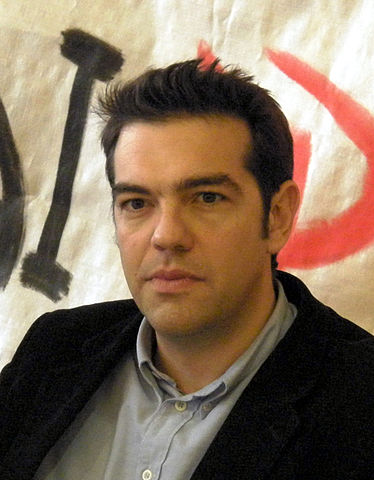![]()
by Peter Martino
Originally published by the Gatestone Institute under the title “Hugo Chavez Coming to Europe”. Republished with permission.

Photo: Alexis Tsipras in a press conference in Komotini, 9 April 2009. (Author: Joanna; Lapost. This file is licensed under the Creative Commons Attribution 2.0 Generic license). Greece’s Syriza party leader Alexis Tsipras (today Prime Minister) posed in February 2014 with a t-shirt celebrating the legacy of Venezuela’s late strongman Hugo Chavez, while he attended the “Hugo Chavez Soccer Tournament”, organized by the Venezuelan Embassy in Athens to commemorate the one-year anniversary of Chavez’s death.
One aspect of the Greek elections to which not much attention has been paid are the consequences for NATO. The huge victory of the extreme-left Syriza party marks the first time that the Far Left takes over a NATO country. In a sense, it is a vindication for the Communists, who lost the Greek civil war in 1949.
Syriza leader Alexis Tsipras, the new Greek Prime Minister, began his political career as an activist of the youth section of the Communist Party. Later, he became the leader of Synaspismos and its successor party Syriza. Both were a coalition of Marxist parties including the Communists and Maoists. The 40-year old Tsipras is an admirer of revolutionary leaders such as Fidel Castro, Ernesto Che Guevara and Hugo Chavez. He named his son Ernesto after the Argentinean-Cuban revolutionary. Two years ago, he flew to Caracas, Venezuela, to attend the funeral of Chavez.
Many of the new Greek ministers are former members of the Communist Party of Greece [KKE]. Nikos Kotzias, the new minister of Foreign Affairs, was a member of the Central Committee of the KKE. Other prominent Communists in the new Greek cabinet are Giorgios Stathakis, the Minister of Economics and Infrastructure, Panaghiotis Lafazanis, the Minister of Energy, and Panos Skourletis, the Minister of Labor and Social Solidarity. Yiannis Dragasakis, also a former member of the Central Committee of the KKE, is Greece’s new Deputy Prime Minister. Although the new finance minister, Yanis Varoufakis, does not have a past in the KKE, he is an economist who describes himself as a libertarian Marxist.
The new Greek cabinet is not a friend of Israel nor of Jews. Syriza is known for its anti-Israeli and pro-Palestinian positions. Syriza politicians have frequently participated in protests against the Jewish state. Clause 38 of the Syriza party program advocates the “abolition of military cooperation with Israel” and “support for the creation of a Palestinian state within the 1967 borders.” Two other members of the new Greek cabinet, although not members of Syriza but of its coalition partner, the ultra-nationalist Independent Greeks [ANEL], are also known for their anti-Semitism. The new Greek Minister of Defense, ANEL leader Panos Kammenos, recently accused Jews of “not paying their taxes.” Adonis Georgiadis, the new Minister of Health, has a history of making similar anti-Semitic remarks.
Syriza is not a friend of NATO, either. Clause 40 of the party program advocates the “closure of all foreign bases in Greece and withdrawal from NATO.” Although no one expects the Syriza government actually to live up to its promise to withdraw Greece from NATO, the change of course in Greece’s foreign policy became apparent on its first day in office, when the new cabinet distanced itself from an EU statement protesting Russian actions in Ukraine and threatening further sanctions against Moscow.
Foreign Minister Nikos Kotzias has been a lifelong ally of whoever is a hardliner in Moscow. In the 1980s, he praised the Communist crackdown on the Solidarity movement in Poland. Today, he is close to the Russian political philosopher Alexander Dugin, an ideologue of the anti-democratic and fiercely anti-American National Bolshevist movement and leader of the Eurasia Party, who wants to restore the Russian Empire as the leading nation of a territorial bloc encompassing the Eurasian landmass. In April 2013, Kotzias invited Dugin to give a lecture at the University of Piraeus, Greece.
Syriza is not only demanding a debt haircut from the rest of European Union of €173.2 billion ($196bn), or 88% of the Greek GDP, making it the biggest debt reduction in history. It is also pushing for a fundamental change in the EU’s foreign policy, from a pro-Atlantic orientation towards a pro-Russian one.
Meanwhile, the electoral success of Syriza is inspiring others. Last Sunday, up to 100,000 Spaniards attended a rally in the Spanish capital Madrid. The rally was organized by Podemos, a party established less than one year ago which, according to polls, could become the largest party in this year’s general elections. Like Syriza’s Alexis Tsipras, Podemos’ leader, the 36-year old Pablo Iglesias, is a former member of the Communist Party and an admirer of the late Venezuelan dictator Hugo Chavez. The three main leaders of Podemos even sat on the board of a foundation that, over the course of the past decade, received at least €3.7m ($4 million) from the Venezuelan government for so-called political advisory work.
Hence, the prospect of a far-left party winning the Spanish elections later this year, thus vindicating the Communists who lost the Spanish civil war, is a real possibility.
Of course, history never repeats itself. Neither Syriza nor Podemos is expected to install a Stalinist dictatorship, but two things are beyond doubt. The Marxist economic remedies that these parties stand for will not lead to more prosperity for their countries, nor will the transatlantic relations between Europe and the United States much improve with governments whose leaders draw their inspiration from Hugo Chavez.
Peter Martino writes about European affairs for the Gatestone Institute.



 RSS
RSS










Latest Comments
Hello Mike, Thank you for your positive feedback to the article. I felt there wasn’t too much critical analysis of ...
Thanks for this considered and well constructed article. A follow up article on the manner in which the editorial contro...
THE CLUELESSNESS OF CLAIMING THAT OBAMA'S MIDDLE EAST POLICIES WERE A FAILURE CANNOT BE FURTHER FROM THE TRUTH, WHAT THE...
As long as Obama is the president of the usa do not trust the us government......
Thank you for an good read....